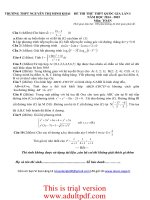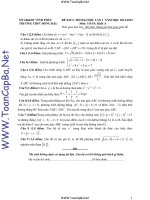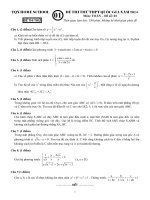Tải Đề thi thử THPT Quốc Gia môn tiếng Anh năm 2020 số 15 - Đề ôn thi tốt nghiệp THPT 2020 môn Anh có đáp án
Bạn đang xem bản rút gọn của tài liệu. Xem và tải ngay bản đầy đủ của tài liệu tại đây (138.8 KB, 10 trang )
<span class='text_page_counter'>(1)</span><div class='page_container' data-page=1>
<b>ĐỀ THI THỬ THPTQG MÔN TIẾNG ANH</b>
<b>NĂM 2020 CÓ ĐÁP ÁN</b>
<i><b>Mark the letter A, B, C, or D to indicate the word whose underlined part differs from the</b></i>
<i><b>other three in pronunciation in each of the following questions.</b></i>
<b>Question 1: A. rains </b> <b>B. jumps </b> <b>C. arrives </b> <b>D. follows</b>
<b>Question 2: A. predator</b> <b>B. restore</b> <b>C. recollect</b> <b>D. preface</b>
<i><b>Mark the letter A, B, C, or D to indicate the word that differs from the other three in the</b></i>
<i><b>position of the primary stress in each of the following questions.</b></i>
<b>Question 3: A. actor</b> <b>B. adult</b> <b>C. effort</b> <b>D. area</b>
<b>Question 4: A. recommend </b> <b>B. fortunate </b> <b>C. entertain </b> <b>D. disappear </b>
<i><b>Mark the letter A, B, C or D to indicate the correct answer to each of the following</b></i>
<i><b>questions.</b></i>
<b>Question 5: We all seem to have a different opinion, so let's let Joey decide, </b> ?
<b>A. will we</b> <b>B. do we</b> <b>C. shall we</b> <b>D. are we</b>
<b>Question 6: On our trip to Spain, we crossed ________ Atlantic Ocean.</b>
<b>A. the</b> <b>B. a</b> <b>C. an </b> <b>D. Ø</b>
<b>Question 7: She likes reading books ________ the library.</b>
<b>A. in </b> <b>B. at</b> <b>C. on</b> <b>D. from</b>
<b>Question 8: The government suggests </b> __ robots to access remote areas that are dangerous
to the lives of militants.
<b>A. designing</b> <b>B. designed</b> <b>C. to design</b> <b>D. design </b>
<b>Question 9: If the bride's father _____ the car, she would be at the Church now.</b>
<b>A. had</b> <b>B. would have</b> <b>C. will have</b> <b>D. has</b>
<b>Question 10: Since Helen ______10 years old, she has mastered Braille as well as the</b>
manual alphabet and even learned to use the typewriter.
<b>A. were</b> <b>B. will be</b> <b>C. has been</b> <b>D. was</b>
</div>
<span class='text_page_counter'>(2)</span><div class='page_container' data-page=2>
<b>A. right after the epidemic has been controlled</b>
<b>B. as soon as the epidemic was controlled</b>
<b>C. when the epidemic had been controlled</b>
<b>D. until the epidemic will be controlled</b>
<b>Question 13: The palace _____ many centuries ago remains practically intact.</b>
<b>A. building</b> <b>B. to build</b> <b>C. built </b> <b>D. people built </b>
<b>Question 14: Good students aren’t ________ intelligent students</b>
<b>A. necessary</b> <b>B. necessity</b> <b>C. necessarily</b> <b>D. unnecessary</b>
<b>Question 15: That’s the trouble with the night shift. It your private life too much.</b>
<b>A. breaks in</b> <b>B. breaks into</b> <b>C. breaks through</b> <b>D. breaks up</b>
<b>Question 16: Foreign students who are ________a decision about which school to attend </b>
may not know exactly where the choices are located
<b>A. doing</b> <b>B. making</b> <b>C. taking</b> <b>D. having</b>
<b>Question 17: The ______ of toothpaste are located in the health and beauty section of the </b>
supermarket.
<b>A. tubes </b> <b>B. pints </b> <b>C. sticks</b> <b>D. quarts </b>
<b>Question 18: At the ______ level, you can join three-year or four-year colleges.</b>
<b>A. primary</b> <b>B. secondary</b> <b>C. postgraduate</b> <b>D. </b>undergraduate
<b>Question 19: Alex dreams of going on tour – he’s just waiting for his big _______ to get his</b>
foot in the door of the music industry.
<b>A. deal</b> <b>B. break</b> <b>C. cake </b> <b>D. cheese </b>
<i><b>Mark the letter A, B, C or D to indicate the word(s) CLOSEST in meaning to the </b></i>
<i><b>underlined word(s) in each of the following questions.</b></i>
<b>Question 20: The student service centre will try their best to assist students in finding a </b>
suitable part-time job.
<b>A. help </b> <b>B. allow</b> <b>C. make </b> <b>D. employ</b>
<b>Question 21: She was brought up in a well-off family. She can’t understand the problems </b>
we are facing.
</div>
<span class='text_page_counter'>(3)</span><div class='page_container' data-page=3>
<i><b>Mark the letter A, B, C or D to indicate the word(s) OPPOSITE in meaning to the </b></i>
<i><b>underlined word(s) in each of the following questions.</b></i>
<b>Question 22: Thousands are going starving because of the failure of this year’s harvest.</b>
<b>A. hungry</b> <b>B. poor</b> <b>C. rich</b> <b>D. full</b>
<b>Question 23. Tom was too wet behind the ears to be in charge of such a difficult task.</b>
<b>A. full of experience</b> <b>B. lack of responsibility</b>
<b>C. without money</b> <b>D. full of sincerity</b>
<i><b>Mark the letter A, B, C, or D on your answer sheet to indicate the sentence that best </b></i>
<i><b>completes each of the following exchanges</b></i>
<b>Question 24: Mary is talking to her professor in his office.</b>
Mary: “Can you tell me how to find material for my science report, professor?”
Professor: “___________”
A. I like it that you understand.
<b>B. Try your best, Mary.</b>
<b>C. You can borrow books from the library.</b>
<b>D. You mean the podcasts from other students?</b>
<b>Question 25: Tim and Tom are discussing where their study group will meet.</b>
- Tim: “Where is our study group going to meet next weekend?”
- Tom: “ ____________”
<b>A. Studying in a group is great fun. </b> <b>B. We are too busy on weekdays.</b>
<b>C. Why don’t you look at the atlas?</b> <b>D. The library would be best.</b>
<i><b>Read the following passage and mark the letter A, B, C, or D on your answer sheet to </b></i>
<i><b>indicate the correct word or phrase that best fits each of the numbered blanks. </b></i>
Have you ever had the feeling that people older than you are hard to understand? Or, have
you felt like people from younger generations just don't get it? Maybe you find it easier to
connect with people (26) __________ are closer to your age than those who are older or
younger than you. You can probably thank the generation gap for these feelings.
</div>
<span class='text_page_counter'>(4)</span><div class='page_container' data-page=4>
Generation (born 1901-1924) is known for its patriotism, hard workers, and loyalty to
institutions. The Millennials (born 1980-2000) are (29) ______ by their dependence on
technology, detachment from traditional institutions, optimism, and open-mindedness. It is
no wonder that many people from different generations have a hard time understanding each
other.
Generation gap refers to differences in actions, beliefs, interests, and opinions that exist
between (30) _______ from different generations. So, what causes these differences?
<i>(Source: />
<b>Question 26. A. who</b> <b>B. whom</b> <b>C. which </b> <b>D. what </b>
<b>Question 27. A. approximately</b> <b>B. apparently</b> <b>C. contemporarily D. currently </b>
<b>Question 28. A. Such as</b> <b>B. For example</b> <b>C. Accordingly </b> <b>D. However </b>
<b>Question 29. A. characterize</b> <b>B. characterized</b> <b>C. characteristic D. characteristically </b>
<b>Question 30. A. members</b> <b>B. individuals</b> <b>C. persons </b> <b>D. human beings</b>
<i><b>Read the following passage and mark the letter A, B, C, or D on your answer sheet to </b></i>
<i><b>indicate the correct answer to each of the questions. </b></i>
As customers choose brands based on how they make them feel, rather than their actual
products or services, there is an intrinsic advantage to those organizations who use designed
experiences as a weapon to cut through the most competitive of markets. Those that don’t,
operate in what we call the “experience gap”, the space between them and their customer’s
expectation of them. Make no mistake, in our high paced and digitally connected economies,
the experience gap is driving markets, fast.
</div>
<span class='text_page_counter'>(5)</span><div class='page_container' data-page=5>
significantly harder work and takes more time to become a bank, but having done that we
can have a much better relationship with our customers and we can offer them a lot more
products and services.”
Think about that for a moment. Do you notice how better experiences, leads to better
relationships, which is then the stepping stone for more offerings? Many brands still jump
straight to modified offerings, without gaining that customer connection and the necessary
foundation of trust first.
<i>(source: /><b>Question 31. What does the passage mainly discuss?</b>
<b>A. The importance of experience to competitive advantage.</b>
<b>B. Businesses are unwilling to disrupt themselves.</b>
<b>C. A far-reaching cultural transformation. </b>
<b>D. Knowledge drives behavior, loyalty, satisfaction. </b>
<b>Question 32. The word “them” in paragraph 1 refers to _______.</b>
<b>A. brands</b> <b>B. customers</b> <b>C. economies </b> <b>D. markets </b>
<b>Question 33. According to paragraph 2, what is true about Instagram and Twitter in the </b>
stated instance?
<b>A. Their reputation famously preceded even the 4th Industrial Revolution.</b>
<b>B. They are the one and only companies providing such revolutionary services.</b>
<b>C. They were the trailblazers for the experience-oriented marketing strategy.</b>
<b>D. Prior to their advent, there were already several competitors in the field. </b>
<b>Question 34. According to paragraph 3, what is the attitude of Robert Bell towards the </b>
customers?
<b>A. He sees them as modern slaves to consumerism.</b>
<b>B. He maintains a healthy relationship of give and take.</b>
<b>C. He displays worship in its purest form towards them. </b>
<b>D. He views them as the golden goose for his business. </b>
<b>Question 35. What does the phrase “stepping stone” in paragraph 4 mean?</b>
</div>
<span class='text_page_counter'>(6)</span><div class='page_container' data-page=6>
<b>C. An important clue to understanding something that is challenging or puzzling. </b>
<b>D. An action or event that helps one to make progress towards a specified goal. </b>
<i><b>Read the following passage and mark the letter A, B, C, or D on your answer sheet to </b></i>
<i><b>indicate the correct answer to each of the questions. </b></i>
Every summer, when the results of university entrance exam come out, many newspaper
stories are published about students who are top-scorers across the country. Most portray
students as hard-working, studious, smart and, generally, from low-income families. They
are often considered heroes or heroines by their families, communes, villages and
communities. And they symbolize the efforts made to lift them, and their relatives, out of
poverty. The students are often too poor to attend any extra-classes, which make their
achievements more illustrious and more newsworthy. While everyone should applaud the
students for their admirable efforts, putting too much emphasis on success generates some
difficult questions.
If other students look up to them as models, of course it's great. However, in a way, it
contributes to society's attitude that getting into university is the only way to succeed. For
those who fail, their lives are over. It should be noted that about 1.3 million high school
students take part in the annual university entrance exams and only about 300,000 of them
pass. What's about the hundreds of thousands who fail? Should we demand more stories
about those who fail the exam but succeed in life or about those who quit university
education at some level and do something else unconventional?
</div>
<span class='text_page_counter'>(7)</span><div class='page_container' data-page=7>
told a newspaper that his inspiration also came from among the world's most famous
drop-outs, such as Mark Zuckerberg of Facebook or Bill Gates who also dropped out of Harvard
University.
Alarming statistics about unemployment continues to plague us. As many as 162,000
people with some kind of degree cannot find work, according to Labour Ministry's statistics
this month. An emphasis on getting into university does not inspire students who want to try
alternative options. At the same time, the Ministry of Education and Training is still
pondering on how to reform our exam system, which emphasises theories, but offers little to
develop critical thinking or practice. Vu Thi Phuong Anh, former head of the Centre for
Education Testing and Quality Assessment at Viet Nam National University in HCM City
said the media should also monitor student successes after graduation. She agreed there were
many success stories about young people, but added that it was imbalanced if students taking
unconventional paths were not also encouraged.
Viet Nam is, more than ever, in desperate need of those who think outside the box.
Time for us to recognise talent, no matter where it comes from or how.
<i>(Source: )</i>
<b>Question 36. Which of the following best describes the main idea of this passage?</b>
<b>A. Many students consider universities as their only way after school.</b>
<b>B. A good model of being successful in the real life out of school.</b>
<b>C. Not many students are successful after graduating from universities.</b>
<b>D. University is not the only way to success. </b>
<b>Question 37. What is NOT stated in the passage about the top-scorers in the entrance exam?</b>
<b>A. The majority of them are poor but intelligent and eager to learn.</b>
<b>B. They are hoped to find the way to better their families’ lives.</b>
<b>C. Their success is more glorious because they attend more classes than others. </b>
<b>D. The students are admired for the great efforts. </b>
<b>Question 38. The word “unconventional” in paragraph 2 could best be replaced by </b>
__________.
</div>
<span class='text_page_counter'>(8)</span><div class='page_container' data-page=8>
<b>Question 39. The author described Tran Nguyen Le Van in the third passage as </b>
__________.
<b>A. a good example to achieve success although he didn’t finish his education.</b>
<b>B. a businessman who gains money by selling mobile phones online.</b>
<b>C. a founder whose website was inspired from social networks like Facebook. </b>
<b>D. a top-scorer who books online tickets and confirm through messages. </b>
<b>Question 40. The word “them” in paragraph 3 refers to _________________.</b>
<b>A. honours</b> <b>B. role-models</b> <b>C. the youngsters </b> <b>D. newspapers </b>
<b>Question 41. The word “plague” in paragraph 4 is closest in meaning to ____________.</b>
<b>A. conflict</b> <b>B. afflict</b> <b>C. remind </b> <b>D. bother </b>
<b>Question 42. According to the fourth paragraph, what is TRUE about the modern exam </b>
system?
<b>A. It puts too much pressure on students who must get a place in a university.</b>
<b>B. Students are not encouraged to do something different.</b>
<b>C. The government is trying to change the theories of exam. </b>
<b>D. Many stories about successful students cannot inspire those who attend </b>
universities.
<i><b>Mark the letter A, B, C, or D on your answer sheet to indicate the underlined part that </b></i>
<i><b>needs correction in each of the following questions.</b></i>
<b>Question 43: A large number of entries has updated in the latest edition of the encyclopedia </b>
recently.
<b>A. large</b> <b>B. has updated</b> <b>C. of</b> <b>D. recently</b>
<b>Question 44: Many places of history, scientific, cultural, or scenic importance have been</b>
designated
national monuments.
<b>A. history</b> <b>B. cultural</b> <b>C. have</b> <b>D. been designated</b>
<b>Question 45: Just as the performance ended, all the concertgoers raised to their feet and</b>
applauded.
</div>
<span class='text_page_counter'>(9)</span><div class='page_container' data-page=9>
<i><b>Mark the letter A, B, C, or D on your answer sheet to indicate the sentence that is closest</b></i>
<i><b>in meaning to each of the following questions </b></i>
<b>Question 46: Helen’s boss earns more money than she does </b>
<b>A. Helen doesn’t earn as much money as her boss</b>
<b>B. Helen’s boss earns less money than she does</b>
<b>C. Helen earns more money than her boss </b>
<b>D. Helen’s boss earns as much as she does</b>
<b>Question 47: Cindy said that “I haven’t seen John since last month.”</b>
<b>A. Cindy said she hasn’t seen John since last month</b>
<b>B. Cindy said she hadn’t seen John since the previous month</b>
<b>C. Cindy said she wasn’t seen John since the previous month</b>
<b>D. Cindy said I hadn’t seen John since the previous month</b>
<b>Question 48: John is not here, perhaps he is ill.</b>
<b>A. John needn't be here because he is ill.</b>
<b>B. Because of his illness, John shouldn't have been here.</b>
<b>C. John might be ill, so he is not here.</b>
<b>D. John must be ill, so he is not here.</b>
<i><b>Mark the letter A, B, C, or D on your answer sheet to indicate the sentence that best </b></i>
<i><b>combines each pair of sentences in the following questions</b></i>
<b>Question 49: You can go out with your friends. Make sure you finish your homework by 5 </b>
p.m
<b>A. As long as you finish your homework by 5 p.m, you can go out with your friends.</b>
<b>B. Unless you finish your homework by 5 p.m, you can go out with your friends</b>
<b>C. You cannot go out with your friends provided you finish your homework by 5 p.m</b>
<b>D. You can’t go out with your friends in case you cannot finish your homework by 5 p.m</b>
<b>Question 50. He has great intelligence. He can solve all the problems very quickly</b>
</div>
<span class='text_page_counter'>(10)</span><div class='page_container' data-page=10></div>
<!--links-->









